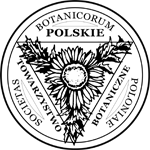Abstract
In pot experiments on cucumber cv. Śremski F1, the effect of short-term chilling on plants earlier treated with triacontanol (TRIA) and Asahi SL was investigated. These plants were grown in a phytotron at an air temperature of 27/22°C (day/night), using fluorescent light with far flux density of 220 µmol × m-2 × s-1, with a photoperiod 16/8. At the 4th true leaf stage, the respective experimental series were sprayed with: 1) H2O - control, 2) TRIA 0.01, 3) TRIA 0.1, 4) TRIA 1.0 mg × dm-3, 5) Asahi SL 0.2, 6) Asahi SL 0.3%. After 24 hours one half of the plants from each experimental series was treated for a period of 3 days at a temperature of 12/6°C, with all the other growth conditions unchanged. The obtained results have shown that short-term chilling stress caused a significant increase in electrolyte leakage, free proline content and in the activity of guaiacol peroxidase in leaves, but a decrease in chlorophyll a+b content, stomatal conductance, transpiration, photosynthesis, leaf area and in the activity of catalase in leaves. The application of TRIA or ASAHI SL on leaves in the pre-stress period reduced the values of the traits which had been increased as a result of chilling and increased those which had reduced. Generally, TRIA was most effective at a concentration of 0.1 mg × dm-3, and Asahi SL at a concentration of 0.3%.
Keywords
stress; biostimulators; electrolytes; proline; catalase; peroxidase; photosynthetic pigments; gas exchange






